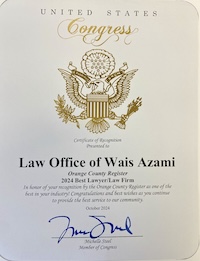- Free Consultation*: (714) 321-9999 Tap Here to Call Us
Will a DUI arrest affect my immigration status?

A conviction for a VC 23152 or 23153 (DUI), can have immigration consequences, depending on the individual’s status. The conviction can be a damaging factor in discretionary decisions, including whether the person will be released from immigration detention on bond, or found to be of good moral character. It usually is a bar to Deferred Action for Childhood Arrivals (DACA). Simply being charged with a DUI can cause revocation of a non-immigrant visa (Without even the conviction). If combined with other factors or charges, a DUI arrest or conviction can lead to inadmissibility or deportability.
A conviction for a VC 23152 or 23153 (DUI), can have immigration consequences, depending on the individual’s status. The conviction can be a damaging factor in discretionary decisions, including whether the person will be released from immigration detention on bond, or found to be of good moral character. It usually is a bar to Deferred Action for Childhood Arrivals (DACA). Simply being charged with a DUI can cause revocation of a non-immigrant visa (Without even the conviction). If combined with other factors or charges, a DUI arrest or conviction can lead to inadmissibility or deportability.
Under current (as of 2017) law a California DUI conviction is not a per se ground of removability: it is not an aggravated felony, a crime involving moral turpitude, or other inadmissible or deportable conviction. It’s possible that could change in the future.
I. Consequences of a Arrest or Conviction for a DUI
A. How can a DUI cause inadmissibility?
Most non-citizens who look for admission into the US must be admissible. A DUI conviction is not a ground of inadmissibility per se. A DUI charge or conviction nevertheless might cause inadmissibility in the following ways;
Inadmissible for convictions for 2 or more offenses of any type, with a total sentence imposed of 5 years or more. Conviction of two or more offenses over one’s lifetime, where in total a sentence of five years or more was imposed (including suspended sentences) causes inadmissibility.
DUI’s involving alcohol: Inadmissible as an alcoholic, which is a physical or mental disorder. A person who suffers from a disorder, including alcoholism, that poses a current threat to self or others is inadmissible.
Current drug addict or abuser: One or more DUI convictions relating to “drugs rather” than alcohol may alert the government to investigate whether the person is inadmissible as a current drug addict or abuser. The person is inadmissible on this basis only if the drug is a federally-defined controlled substance, and if the use was non-medical, meaning that a doctor did not prescribe the drug for the person. So, a person addicted to opioids prescribed by a physician, or other substances, is not inadmissible under this ground.
The standard is supposed to be whether the person meets current DSM diagnostic criteria for substance-related disorder…. However, advocates report that some U.S. consulates apply a different, older standard, where drug abuse can be found if the person admits engaging in more than one-time experimentation within the last three years.
The controlled substance inadmissibility ground also reaches a person who formally admits having committed all of the elements of a controlled substance offense, even without a conviction. An immigrant with a drug-related DUI should not admit to any DHS officer that she possessed a federally-defined controlled substance.
B. Good Moral Character
An applicant must establish that she has been a person of good moral character(GMC) for a set period of time (for example, the preceding five years) in order to qualify for naturalization to U.S. citizenship, as well as several forms of relief such as cancellation of removal for non-lawful permanent residents under INA 240A(b), benefits under the Violence Against Women Act (VAWA), one of the forms of voluntary departure, and registry.
To do this, first the person must show that she does not come within any of the bars to establishing GMC. Second, she must show that in fact she has been a person of good moral character during the required period. The adjudicator has discretion to decide the second question, using a balancing test to compare positive and negative factors. See discussion of “good moral character” at N.17 Relief Toolkit atwww.ilrc.org/chart.
Statutory or Regulatory Bars. Although a DUI itself is not an automatic bar to GMC, it might serve as one when combined with other factors. The person is barred if the following occurs within the period for which GMC must be shown. The following are can prevent an immigrant from showing GMC; 1) Habitual Drunkard. 2) Multiple convictions for a DUI might lead to a finding that one is a habitual drunkard. 3) Convictions for 2 or more offenses of any type, with a total sentence imposed of 5 years or more. 4) Confined to a Penal Institution for 180 Days or More. A person who, as a result of a conviction, has been in jail or prison for 180 days or more during the statutory period is barred from establishing GMC. This bar is triggered by how much time the person has actually been confined, not by what the official criminal “sentence” was. The conviction could be for a DUI or any other offense. 5) On Probation or Parole. Federal regulation prohibits naturalizing someone who is currently on probation or parole for any offense. This means that someone who is on probation or parole on the date of the interview cannot be granted naturalization. They can apply for naturalization while on probation or parole as long as probation or parole ends by the interview date.
GMC and Discretion. A person who is not barred from establishing GMC still must establish that she in fact has been of good moral character during the required period. Because a DUI conviction can be a serious negative factor in this determination, anyone with a recent DUI should consult with an expert advocate before applying for naturalization, or for immigration relief requiring GMC. If she does go forward, she should provide evidence that she is rehabilitated, along with all possible evidence of positive GMC factors, such as community service. The adjudicator must weigh the positive factors against negative ones in making the decision. Some regional offices, individual officers, and immigration judges, treat DUI’s more harshly than others do — so gathering information about local practices can be very valuable.
A DUI conviction may make a person ineligible to apply for, or at risk of losing, some other relief or benefits, regardless of whether or not the person is inadmissible or has good moral character.
A DUI conviction is a bar to Deferred Action for Childhood Arrivals (DACA). A misdemeanor DUI conviction under Cal. Vehicle Code 23152 or 23153 is a “significant misdemeanor” and a bar to eligibility for DACA.
A DUI charge, even without a conviction, can trigger revocation of a non-immigrant visa such as an F-1 student or H-1 employment visa. Under recent policy guidance, a U.S. consulate may revoke a non- immigrant visa based on evidence that the person was charged with a DUI offense, even if there was no conviction. The consulate might send a letter to the person stating that the visa has been revoked and that she should return to the home country to meet with consular officials there. Noncitizens should not do this without speaking to an expert immigration advocate.
Possible Bar to Asylum or Withholding of Removal: Conviction of a “particularly serious crime” (PSC) is a bar to asylum and withholding of removal. Whether any given conviction is a PSC depends upon a number of factors, including the nature of the offense, the underlying facts, and the sentence imposed. Depending on the circumstances of the offense, a single DUI or multiple DUI convictions might be charged as a PSC barring eligibility for asylum or withholding of removal.
Enforcement priority: The Obama Administration created a list of offenses, which included any DUI, that would make the person an enforcement priority. The Trump Administration has abandoned the list approach and states that any undocumented person, especially one who may have committed any crime, is a priority. However, in practice a DUI conviction still makes the person a special target. In 2017, ICE agents have continued to go to the last known address to arrest and detain some undocumented persons with DUI convictions, including DUI convictions that are many years old.
Discretionary Denial of Immigration Bond: A DUI conviction often will result in a discretionary denial of bond and release from ICE detention. A reckless driving conviction is an adverse factor in bond and release determinations, but it appears to be significantly less damaging than a DUI.
D. Removability/Deportability
A DUI might lead to a charge of deportability if the DUI was with the charge of child abuse due to a child being in the car, if it’s determined that the DUI is based on an addiction as opposed to an indiscretion, or travel after conviction of two or more offenses with aggregate sentence of at least five years.
A conviction for a DUI does not usually have the following immigration consequences because it is not considered one of the deportable or removable crimes; aggravated Felony, Deportable Controlled Substance Conviction, or a Crime of Moral Turpitude.
II. Future Penalties for DUI Convictions?
Non-citizens who have a DUI conviction should keep in contact with an immigration attorney in case a law passes that imposes new consequences. The new law might cause permanent residents to become deportable based on a DUI conviction, when they were not deportable before.
III. Reckless Driving Charge or Conviction
Reckless driving is classified under Cal. Veh. Code 23103, 23103.5, and 23104. In general, a conviction for reckless driving is better than a DUI conviction, because of all of the potential DUI consequences listed above.
Law Office of Wais Azami takes DUI & Immigration seriously. We primarily practice criminal law for immigrants. Call (714) 321-9999.
My posts/blogs are to be taken for academic purposes only and NOT LEGAL ADVICE. Nothing on my blogs should lead you to believe there is an attorney-client relationship, nor that I am giving legal advice. Please call my office at (714) 321-9999 for a free consultation to discuss your specific matter where I could then give proper legal advice.













